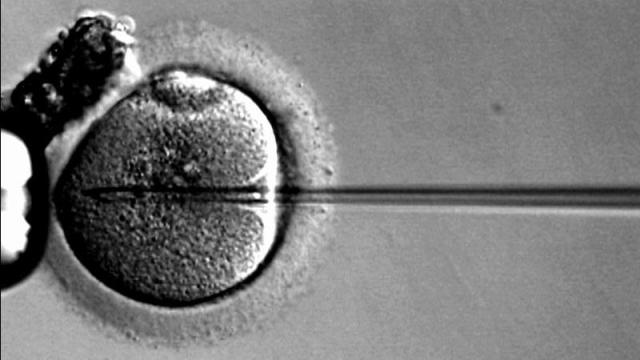A popular fertility treatment introduced in the early 1990s has been linked to low sperm counts in men born from the procedure. Scientists aren’t entirely sure why this is happening, but it’s entirely possible that fathers are passing their fertility issues down to the next generation.
An egg is injected with sperm during ICSI (Image: Public domain)
A new study published in Human Reproduction has linked intracytoplasmic sperm injection (ICSI) to lower sperm counts and lower sperm quality in men conceived by the popular fertility treatment. This common type of IVF treatment is used to help couples in which the prospective father has some form of infertility, leading the study’s authors to suspect a genetic link — though that has yet to be proven. It’s another case where correlation is not necessarily causation.
“These findings are not unexpected,” said André Van Steirteghem, a consultant at the University Hospital in Brussels and a co-developer of the treatment. “Before ICSI was carried out, prospective parents were informed that it may well be that their sons may have impaired sperm and semen like their fathers.” But as Steirteghem explained in a release, this information was not necessarily a deal breaker because many parents saw ICSI as a solution for their future sons.
The first person to be conceived via ICSI happened in 1992, so it hasn’t been possible to study men born from the procedure until now. During ICSI, doctors take sperm from the father and inject it directly into the mother’s egg. The fertilised egg is then placed in her womb. Many men who opt for ICSI have defective sperm, so doctors have to choose the best candidates from what’s available.
For the new study, 54 men conceived by the procedure between the ages of 18 to 22 had their sperm tested. The results were discouraging, to say the least. These men had nearly half the sperm concentrations found in naturally conceived men of roughly the same age, and a two-fold lower count of motile sperm (that is, sperm that swim well). The men were also four times more likely to have sperm counts below levels deemed normal by the World Health Organisation.
The researchers say that genetic factors may be responsible, but they’re not ruling out other possibilities. They say the results highlight the need to perform more follow-up studies on children conceived by assisted reproduction.
“For instance, paired analysis of samples from fathers and sons should be carried out, and we need to look at larger numbers of offspring,” said Van Steirteghem. “[H]ealth authorities and funding agencies should provide the means to answer questions concerning the effects of genetics, mode of conception, fetal growth patterns and birth weights on the fertility of ICSI men.”
As previously noted, ICSI and other techniques could conceivably be used to help individuals born via this technique to produce their own children. If genetics is eventually implicated, that would be insufficient reason to withhold the practice from men with severe fertility issues. What’s more, telling a man he can’t have children because he’s somehow genetically deficient is basically eugenics. And with the eventual advent of genetic engineering, we’ll just eliminate heritable male infertility altogether.
